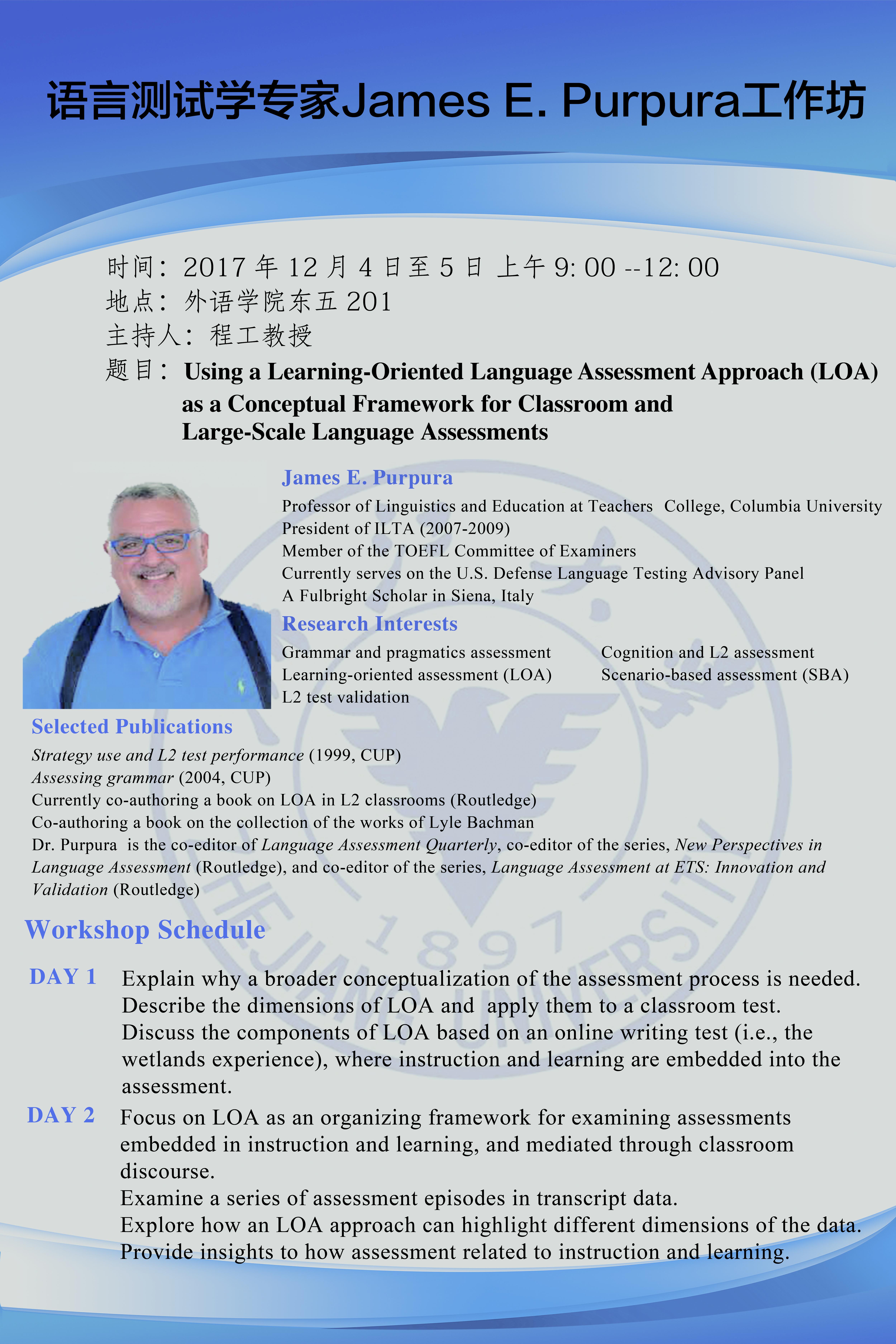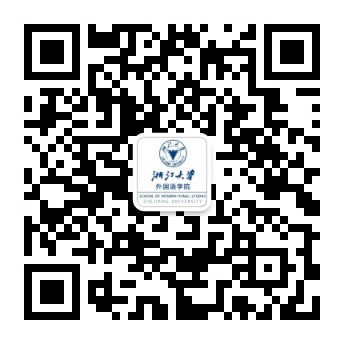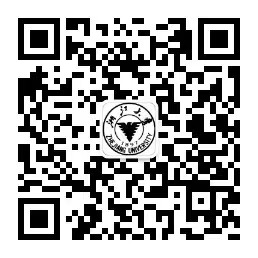讲座题目: Using a Learning-Oriented Language Assessment Approach (LOA) as a Conceptual Framework for Classroom and Large-Scale Language Assessments
讲座嘉宾:James E. Purpura教授
主 持 人: 程工 教授
讲座时间:2017年12月4日(周一)上午9:00~12:00
2017年12月5日(周二)上午9:00~12:00
讲座地点:紫金港校区东五201会议室
欢迎广大师生积极参加!

Abstract:
L2 assessments have always been used by second and foreign language (L2) teachers as a basis for obtaining information on what students have learned in class and on what still needs to be learned. However, it was not until the late 1990’s that L2 assessment researchers became seriously interested in examining the nature of these classroom assessments, and their efficacy not only in confirming learning outcomes, but also in providing an evidentiary basis for decision-making about further learning. This interest in L2 classroom-based assessment research grew out of two traditions. First, it was influenced by the work in mainstream education on formative and summative assessment (e.g., Andrade & Cizek, 2010; Black & Wiliam,1998) and the research-based principles of “Assessment OF, FOR, and AS learning” (Assessment Reform Group, 2002; Black et al., 2003; Earl, 2013; Gardner, 2012). Second it drew inspiration from research in L2 assessment that examined teacher practices, processes and assessment decision-making (Colby-Kelly & Turner, 2007; Leung & Teasdale, 1997; Rea-Dickins, 2001, 2007), the role of teacher knowledge, experience and beliefs in using assessments (Brindley, 2001, Gardner & Rea-Dickins, 2001), the washback effects of standards- and outcomes-based assessment on teaching, learning and policy (Brindley, 1998, 2001; Davidson, 2007), and on research related to the promotion of L2 teacher assessment literacy.
While classroom-based assessments have always been organized with an eye towards learning, and instruction, large-scale standardized tests and even some formal classroom tests have remained agnostic to the potential interfaces among assessment, learning, and instruction. The idea that language assessments could be designed around anything other than displays of performance relating to L2 proficiency has been met with some skepticism. However, today, sophisticated information technologies have made it possible to design assessments around group problem-solving or project-based tasks, for example, in which assessment, instruction, and learning are critical components of the process, and where test takers need to show not only their ability to display their L2 proficiency, but are also expected to learn from instruction in this social context.
Conceptual frameworks for L2 assessment design (Bachman & Palmer, 2010; Mislevy et al., 2002), however, have traditionally focused on the indicators of L2 KSAs being accessed, the quality of the evidence needed to score these indicators, and the methods used to elicit and control samples of L2 proficiency being elicited. In this regard, these frameworks are efficient in specifying performance indicators and conditions for elicitation; however, they fail to address, from the design stage, how other factors in the assessment context, related to instruction and learning, can systematically moderate performance in both construct-relevant and construct irrelevant ways (Purpura & Turner, forthcoming)―features of the assessment process that, in my opinion, should be specified and accounted for, when possible. To address this gap, Purpura and Turner (Forthcoming) proposed a learning-oriented assessment approach to classroom and large-scale assessment in which multiple dimensions of the assessment context converge to address synergies among assessment, instruction, and learning
The goal of the workshop is to introduce participants to a leaning-oriented approachto assessment so that this approach can be used as a conceptual framework for the design and validation of summative assessments. On the first day of the workshop, I will explain why a broader conceptualization of the assessment process is needed. Then, I will describe, in some details, the dimensions of LOA and we will apply them to a classroom test. After that, we will discuss the components of LOA based on an online writing test (i.e., the wetlands experience), where instruction and learning are embedded into the assessment.
The second day of the workshop focuses on LOA as an organizing framework for examining assessments embedded in instruction and learning, and mediated through classroom discourse. Using a modified conversation-analytic approach, we will examine a series of assessment episodes in transcript data and will explore how an LOA approach can highlight different dimensions of the data and provide insights to how assessment related to instruction and learning.
Dr. James E. Purpura is Professor of Linguistics and Education at Teachers College, Columbia University, where he teaches courses in L2 assessment and research methods. His research focuses on grammar and pragmatics assessment, cognition and L2 assessment, learning-oriented assessment (LOA), scenario-based assessment (SBA), and L2 test validation. He has written Strategy use and L2 test performance (1999, CUP), Assessing grammar (2004, CUP), and is currently co-authoring a book on LOA in L2 classrooms (Routledge) and a book on the collection of the works of Lyle Bachman. Jim is the co-editor of Language Assessment Quarterly, co-editor of the series, New Perspectives in Language Assessment (Routledge), and co-editor of the series, Language Assessment at ETS: Innovation and Validation (Routledge). He served as President of ILTA (2007-2009), as member of the TOEFL Committee of Examiners, and currently serves on the U.S. Defense Language Testing Advisory Panel. He was recently a Fulbright Scholar in Siena, Italy, where he worked on an LOA approach to scenario-based assessments. Jim is co-founder of LOA Solutions Inc., which provides a platform for Internet and mobile phone delivery of assessments that enable rapid iteration and artificial intelligence to improve authenticity, efficiency, feedback, and design.
浙江大学外国语言学及应用语言学研究所
2017.12.1



